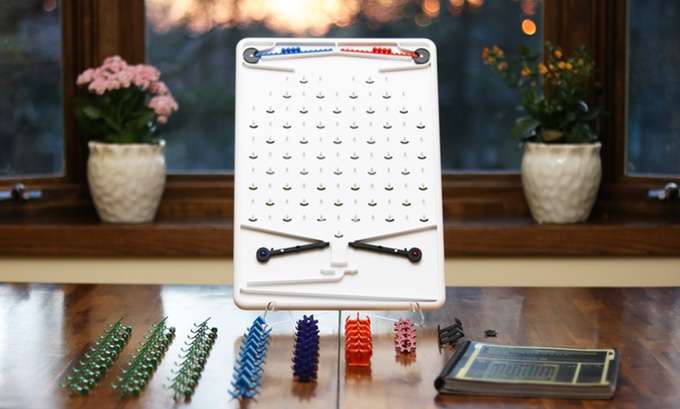June 6, 2017 weblog
A board, some marbles and kids get feel of how computers work

(Tech Xplore)—Turing Tumble is a Kickstarter project that has taken off with much success. And the game has a mission. Paul Boswell designed it to teach kids about building mechanical computers. That is, it's a type of game where—forget electronics gear— kids go over to a board powered by marbles to solve logic puzzles.
As The Mac Observer remarked, this is a game that gets down to the fundamentals, as children learn the building blocks of how computers work.
Turing Tumble components include game board, stand, ramps, bits, gear bits, presser, red and blue marbles and puzzle book.
Mark Frauenfelder in BoingBoing delivered a capsule view of it as "a mechanical computer with switches that are activated by rolling marbles down an inclined plane."
The board releases one marble at a time; the marbles are from the top, and each marble falls down the board. On reaching the bottom, it pushes down one of two black flippers at the bottom releasing another ball. If it pushes down the left flipper, a blue ball is released. If it pushes down the right flipper, a red ball is released.
As Kickstarter page explains, players add logic by putting six different types of parts onto the board:
"You're building a real computer using mechanical levers and switches and stops and marbles and gravity," said Bryan Chaffin in The Mac Observer.
In a way, the game is like a pachinko machine, said Chaffin, "but one without the illusion of randomness." Every action of the marble, he said, is controlled by the pieces you put into place.
This mechanical computer can do things like add, subtract, multiply, divide, and create patterns.
How did Boswell come up with this game and why? He said when he was a professor at University of Minnesota he saw how important it was for all students to learn to code. Sure, there were other products designed to teach kids about computers but, he said, treating computers like abstract black boxes.
Boswell said they "overlook the most amazing concept," he said, "how a bunch of simple switches connected together in clever ways can do incredibly smart things."
With this game, he said, the logic is not hidden behind a computer chip. It's right there in front of them. No electronics at all.
Tech-watching sites praised his project.
"Hopefully the Kickstarter will meet its goal and the Turing Tumble will cruise on into full production, because this delightful mechanical computing system really is a brilliant bit of engineering," said Eric Limer, Popular Mechanics.
The game experience is simple enough for kids, he added, but complex enough "that a computer programmer might even find a challenge building out puzzle 51."
Limer was referring to 51 puzzles included with the device. Some can be solved quickly, but others may require repeated attempts to complete.
BoingBoing made the point that these puzzles have a rhyme and reason.
"They start out easy and become steadily more challenging. Each puzzle leads the player to discover new concepts that can be applied to more complicated puzzles later on."
The puzzles are woven into a 20-page story illustrated by Jiaoyang Li, a senior at the University of Minnesota.
What's the progress as a Kickstarter effort? His project apparently has a great draw of interest. With 22 days to go, at the time of this writing, $180,896 was pledged out of a $48,000 goal.
I Programmer wrote about its funding path.
"its original goal for of $48,000 was reached within 14 hours, and it had double that the following day."
A pledge of $60 gets you Turing Tumble with estimated delivery in January. The game includes the board, parts, marbles, and the puzzle booklet.
More information: www.kickstarter.com/projects/8 … -mechanical-computer
© 2017 Tech Xplore




















